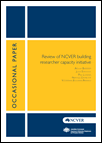Description
In mid-2010 NCVER undertook a review of its building researcher capacity initiative in order to inform its direction into the future. The review found that the initiative had achieved a high profile among vocational education and training (VET) practitioners. The scholarship programs had heightened awareness about the role research can play in fostering good practice and a culture of evaluation. The review found, however, that more work needs to be done to find the best ways to encourage new VET researchers within universities.Summary
About the research
The National Centre for Vocational Education Research (NCVER) is committed to building researcher capacity in the vocational education and training (VET) sector by encouraging early-career researchers, VET professionals and experienced researchers from outside the sector to undertake research in vocational education and training. In support of this, NCVER allocated $450 000 over three years to four programs: community of practice scholarships aimed at novice researchers undertaking a workplace-focused research project; academic scholarships aimed at VET professionals undertaking an academic course of study such as honours or masters by research; a fellowship scheme; and the VET Researcher of the Year Award. NCVER has initiated a review of these programs, now in their third year, to inform future directions.
This review explored the effectiveness of the programs in expanding the number and quality of researchers in the VET sector, other benefits of the programs, value for money, as well as the effectiveness of management arrangements and communication.
Key messages
- NCVER's building researcher capacity initiative has achieved a high profile in the VET research community.
- The outcomes achieved from the various building researcher capacity programs were mixed, in particular:
- Arguably, the community of practice program has been the most popular and successful program, with participants producing research that is having an impact in their organisations. However, given the focus on small, workplace-based projects rather than academic research, it is unlikely that the program will actually produce many new researchers for the VET sector.
- The impact of the academic program has been harder to assess, as only one participant has completed to date. However, it is likely that the participants would have enrolled in these courses of study without the NCVER funding.
- In terms of the fellowship program, to date this has not generated the interest that was originally anticipated. However, at the time of the review, one new fellowship was being confirmed and another being investigated.
The findings of the review will feed into the building researcher capacity program.
Tom Karmel
Managing Director
